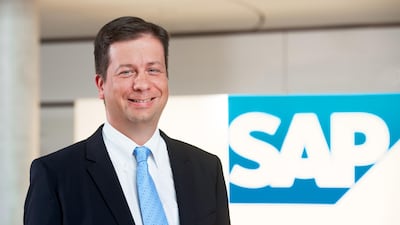SAP, Europe’s largest technology company, is aiming for $1 billion in revenues from the Middle East by 2020 as the company capitalises on the growing demand of cloud services in the region.
"Considering the potential in local economies and the extraordinary readiness to adopt technology, the Middle East will continue to serve as one of the fastest growing markets for SAP," Luka Mucic, chief financial officer and member of the board at SAP, told The National. "And certainly there will be a good share of cloud in this growth."
In the second quarter of this year, SAP's cloud and software revenues increased 10 per cent year-on-year in its Europe, Middle East and Africa markets. The size of the public cloud services market in the Middle East and Northern Africa (Mena) is expected to grow by more than 106 per cent, to $1.97 billion in 2020, up from $956m in 2016, according to Statista.
The UAE is a tech front-runner, with its IT market forecast to grow 20 per cent to $6.6bn by 2021 from $5.5bn in 2018, according to Fitch Solutions.
________________
Read more:
SAP aims to expand Middle East portfolio with UAE data centre
Amazon targets 3,000 cashierless stores in the next three years
________________
The German-headquartered tech giant launched its UAE data centre, which houses secure servers for local cloud computing clients, in Dubai last month. This is the company’s third centre in the region, with others in Riyadh and Dammam in Saudi Arabia.
Over the last decade, SAP grew its Middle East business five-fold and has consistently maintained a compound annual growth rate of up to 30 per cent during the past few years, according to Mr Mucic.
The company has a five-year $200 million investment plan in the UAE that it launched last year and in Saudi Arabia it has a similar, but smaller, investment strategy of $82m to set up data centres and co-innovation labs where local companies can utilise SAP services in new technologies.
Globally, SAP competes with companies such as Salesforce.com and Oracle to offer cloud services. In the region, there are other major players coming on the scene.
Alibaba Cloud, the cloud computing arm of Chinese e-commerce group Alibaba, opened its first data centre in Dubai in November 2016 and announced plans to open its second this year.
Amazon Web Services has also signed an agreement with the Bahraini government to open at least three data centres by next year.
In March, Microsoft announced plans to open data centres in Dubai and Abu Dhabi, its first in the Middle East, as the software maker seeks to capitalise on the region’s growing demand for digitisation.
"We have a holistic growth plan in place. We have plans to open a co-innovation lab and our next generation technology space that we call 'Leonardo Centre' in our regional headquarters Dubai in the coming months," said Mr Mucic.
Leonardo Centres offer physical spaces for companies and partners to explore how new technologies like Internet of Things, machine learning, blockchain, big data and cloud can help spur digital transformation. Currently, SAP has four such centres in Bangalore, New York, Paris, and Sao Leopoldo.
Unsurprisingly, companies from the oil and gas industry are among SAP's biggest clients in the Middle East, including Saudi Aramco, ADNOC and ENOC. But SAP is looking to diversify with new clients in other sectors.
“We are growing our presence in the retail and public sector. We see huge scope in smart city projects like Smart Dubai, and upcoming megaproject Neom,” said Mr Mucic.
Neom is a $500 billion (Dh1.8 trillion) futuristic business, industrial and tourism hub on Saudi Arabia's Red Sea being financed by the kingdom's sovereign wealth fund.


